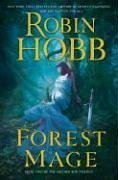** spoiler alert ** Reviewing the whole Soldier Son trilogy in one review, since it's one ongoing story.
(Shaman's Crossing, Forest Mage, and Renegade's Magic)
I consider myself to be a fan of Robin Hobb. I've read everything published under her name, with the exception of the two most recent 'Dragon' novels. I've given every single one of those books 4 or 5 stars. I've also read about half of what she's published as Megan Lindholm, and loved most of that as well.
Unfortunately, I feel that the Soldier Son trilogy is her least successful work to date.
It's not terrible, but it didn't hold up to my high expectations.
I think that part of this is that while her previous epics have shown the reader a rich tapestry of a world, with multiple important characters and settings, this story follows one person, Navare (the Soldier Son) for over 2000 pages. And, to be honest, he's rather a tiresome person. I don't demand that characters be likable, but I just didn't find him interesting. He's a bit of an annoying prig. I wished that some of the more minor characters in the book had been fleshed out more, and that we had a chance to see things from their point of view. (Epiny! And her magic! It just gets dropped...) The third book is largely concerned with the conflicts of Navare's suddenly-split-personality. It's him arguing with himself for hundreds of pages. (Tiresome vs. annoying!) I feel like it's partly because other characters weren't developed enough.
The story also moves very slowly. I felt like Navare's journey could have been condensed into one book, one-third of the length, and it would have been improved. I love long books, but this story seemed to have two main themes: the problems of cultural imperialism, and the importance of not judging people based on their physical appearance. Now, these are two very valid and important themes, but part of the reason that I do really like long books is that they have room in them for lots and lots of different ideas and themes. Not just two, repeated frequently. I also felt that these two themes weren't dealt with very satisfactorily: OK, it's bad and wrong to disrespect another culture, regard them as primitive when they aren't, and to destroy their native lands. I'm with that. It's also inevitable that, due to economic and other factors, peoples move, expand, and come into conflict with each other, bringing about cultural change. I also agree that is true. So the solution? Cause an economic distraction somewhere else causing everyone to run off elsewhere. Eh, well, maybe. Not terrible, but not really a full analysis of the problem, either.
However, I had a bigger problem with the other issue. After a million or so pages of Navare being prejudiced against because of his magically-induced obesity, and having it pointed out ad infinitum that what one culture may consider reprehensible and disgusting, another culture may respect, etc, the story ends up with Navare (again magically) being restored to his former thin, handsome appearance. It really undercuts the whole message of the book.
However, like I said before, it wasn't terrible. Hobb is still an excellent writer, and I did like that each of the cultures in the book was portrayed as having both positive and negative qualities. It was interesting and thoughtful enough to get me through all three very long volumes. It just wasn't as good as I'd expected.




